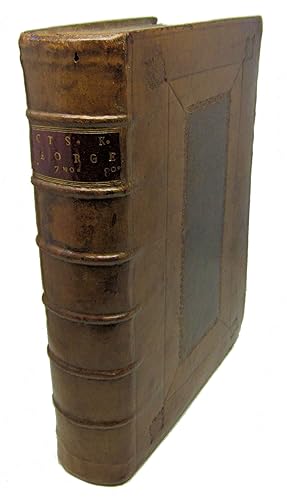Descripción
Twelve British Parliamentary Acts relating to the South Sea Company during the period immediately following the burst of the South Sea Bubble. Contained in two bound volumes for the years 1721/1722 and 1722/1723. First edition, first printing. Folio (11 inches). 7 George I (1721): 588 pages (being the text of 32 Acts of the 6th Session, 5th Parliament) + 14 pages (being the single Act of the 7th Session, 5th Parliament) + 1 page (being a note on the single Act passed in the 7th Session) + 4 pages (Table of the Statutes passed in the 6th Session); bound together with 8 George I (1722): 440 pages (being the text 31 Acts of the 8th Session, 5th Parliament) + 4 pages (Table of the Statutes passed in the 8th Session). 9 George I (1722/1723): 735 pages (being the text of 32 Acts of the 1st Session, 6th Parliament) + 4 pages (Table of the Statutes passed in the 1st Session). Both volumes are complete with all conjugate blank leaves. Printed in Black Letter font on laid watermarked paper. Each Act is prefaced by a General Title leaf with woodcut Royal coats of arms (except 7 George I, Chapter 9; 7 George I, Chapter 14; 8 George I, Chapter 29; and 9 George I, Chapter 25 which were issued without the General Title leaf). Woodcut ornamental initials. Handsome contemporary polished calf binding, panelled boards with blind rules and corner ornaments, raised bands on spines with red calf lettering pieces. Bindings are robust, well preserved and entirely functional. Edges and corners a bit bumped, boards and spine lightly scarred, and lettering piece to 9 George I slightly chipped (without loss of text). The paper upon which the Acts were printed varies in appearance from bright to somewhat toned, owing to the different paper stocks used. Internally very clean. A rare find. The South Sea Company, incorporated in 1711 by an Act of Parliament, had its origin in the idea that the government could sell trading monopolies in return for funds to reduce or eliminate its national debt. The Company was thus granted a monopoly of the British trade with South America and the Pacific Islands and profited handsomely by assuming successive portions of the national debt in exchange for South Sea Company shares. The Company appeared prosperous and successful in servicing its responsibility to the national debt, and in 1719 took on the whole of the national debt in return for further concessions, beating off competition from the Bank of England for the privilege and profits. But by 1720, speculation in shares in the Company had got out of hand, and share value soared. Profit-taking quickly reversed the climb in share value, and sellers of stock soon outnumbered buyers. South Sea Company stock value quickly tumbled from £1000 to £175 in a matter of days, dragging a large part of the economy into financial collapse, including the Bank of England. The stock market crash, known as the South Sea Bubble, was blamed on the fraudulent activities of company directors in stock-jobbing and gambling mania. By the end of 1720, thousands of investors had been ruined, and Parliament was investigating the affair. When large scale bribery, fraud, and false accounting were exposed, the director's estates and assets were confiscated. The South Sea Company managed to continue operations (mainly in the African slave trade, for which it maintained its Assiento or contract with Spain to provide Spanish colonies with Negro slaves, in association with the Royal African Company and the Royal Navy) until about 1750, and then sold out its remaining rights to the Spanish government. The collection of 12 Acts consists of Sperling numbers 302-307, 418-420, 446-447, plus one Act not noted in his bibliography. (Please consult the image for a list of the precise titles of each Act.) Additional details and a full listing of all Acts contained in the volumes are available upon request. The volumes are heavy and will require additional shipping charges. N° de ref. del artículo 146
Contactar al vendedor
Denunciar este artículo
![]()




